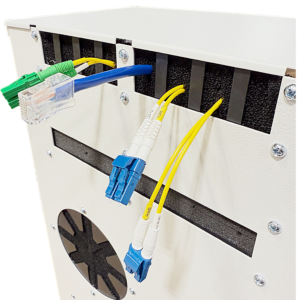Maximize Cooling Efficiency in High-Heat Medical Equipment
Medical equipment that generates heat, such as medical lasers, surgical robots, sterilization equipment, and blood analyzers, require a reliable thermal management system to ensure optimal performance and prevent damage to sensitive components. Thermal management systems can be achieved through various methods, one of the most cost effective of which is direct air cooling.
Filters play a vital role in thermal management by preventing debris, dust, and other particulate matter from clogging the equipment’s cooling system. If particulate matter is allowed to accumulate, it can restrict the flow of air and reduce the system’s cooling capacity. This can lead to overheating, reduced performance, and even complete system failure. UAF filters don’t just prevent particulate from encroaching on your equipment, many of our filters are made with a UL-94 rated coated foam that will help inhibit any fire that starts in the protected piece of equipment.

Medical equipment is especially susceptible to damage from overheating, as it often operates for extended periods and generates large amounts of heat. The use of filters can help prevent these issues by ensuring that the cooling system is operating at its maximum efficiency, reducing the risk of damage to sensitive components.
In addition to preventing debris and other particulate matter from clogging the cooling system, filters can also play a crucial role in preventing the buildup of bacteria and other harmful microorganisms. Filters can help prevent the spread of airborne pathogens by trapping them within the filter media. This not only protects the equipment but also helps maintain a sterile environment for the patient. In medical settings, the use of high-efficiency particulate air (HEPA) filters is common, as they can effectively capture particles as small as 0.3 microns in size. UAF can go further: we have specialized media embedded with silver and copper ions that actively kill bacteria and viruses captured by the filter.
Filters can also extend the life of equipment by protecting sensitive components from damage caused by exposure to harmful particles and other contaminants. By ensuring that the cooling system is functioning correctly, filters can help prevent premature failure of components, which can result in costly repairs or equipment replacement.
Air filters play a crucial role in the thermal management of medical equipment that generates heat. They help prevent damage to sensitive components, maintain a sterile environment, and extend the life of equipment. As such, it’s essential to use high-quality filters and to ensure that they are regularly maintained to ensure optimal performance. By doing so, medical professionals can ensure that their equipment operates at its best, which helps to improve patient outcomes and reduce the risk of equipment failure.
If your equipment requires enhanced filtration protection, contact UAF now and we’ll connect you to a dedicated filtration solution engineer for assistance with your application.

Universal Air Filter Launches CableVent™ Cable Management Solutions Universal Air Filter is pleased to announce the launch of CableVent™, a revolutionary cable management system designed to meet the evolving needs of modern electronics enclosures. CableVent™ goes beyond traditional brush-like cable management systems. Unlike rigid, one-size-fits-all solutions, CableVent™ is fully customizable to fit any enclosure, regardless […]
Author:
Date: 2025-03-25
View More

Discover how Universal Air Filter’s custom Quadrafoam filters and FaraVent EMI solutions are transforming medical device engineering. Learn why leading manufacturers trust UAF for high-performance, tailored filtration systems that protect critical equipment across industries. Unleashing Innovation in Medical Device Filtration In the fast-paced world of medical device development, engineers face the constant challenge of balancing […]
Author:
Date: 2025-03-13
View More

As spring breathes new life into the world, Universal Air Filters stands at the forefront, safeguarding the integrity of telecommunication infrastructure across the nation. While our primary mission remains to shield equipment from dirt and pollen, the onset of spring unveils a myriad of unforeseen challenges—from pesky crawlers to airborne nuisances. At Universal Air Filters, […]
Author:
Date: 2025-03-12
View More